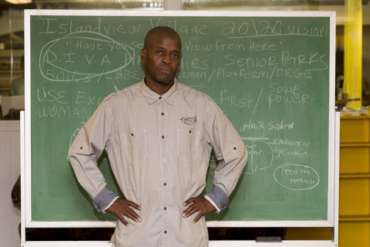Dwight Roston got into all kinds of trouble as a teenager. “I was fighting a lot, stealing cars—a little bit of everything,” the 23-year-old admits.
Eventually he got kicked out of his high school and put on probation. As part of the community service he had to do, Roston started volunteering at Church of the Messiah, a non-traditional Episcopalian church in the Islandview neighborhood north of Belle Isle.
While waiting on his first day of work, he drew a few pictures. That’s also the day he met Pastor Barry Randolph. After noticing the drawings, the pastor took an interest in the teenager and asked why he was on probation.
“I thought he would complain,” Roston says. “That’s what I was used to with adults. I kept asking myself, ‘What does he want?’ He didn’t want anything; he just wanted me to do what I was meant to do.”
The multitalented Roston can do a lot—music-making, drawing, and modeling. Several years ago he got a camera and became interested in videography. One day, he and three friends approached Randolph and inquired about starting a video production company.
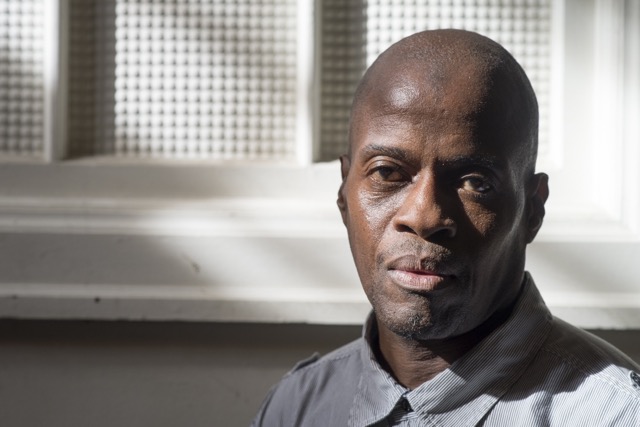 Pastor Barry Randolph
Pastor Barry Randolph
“This is how stupid we are,” Randolph says. “You come with an idea and the least of what you need, and we go ahead and get started. All they had was a camera. They didn’t know about video production and neither did I—so naturally let’s get started.”
The four young men started I AM Productions, which does filming and editing. Roston also worked for PBS over the summer on the Digital Diaspora Roadshow and says he takes his camera everywhere.
It might be strange for someone, especially a teenager, to ask a pastor for help starting a business. But in some Detroit communities that lack access to jobs and entrepreneurial avenues, a surprising institution has stepped up to provide economic opportunities: the church. Typically thought of as inhabiting only the spiritual realm or providing support for the indigent, Detroit churches are branching out to be more than that for their neighborhoods—as business incubators and job skill trainers.
Entrepreneurs in action
Pastor John Cummings of Grace in Action, a Lutheran church in Southwest Detroit started by him and his wife Meghan Sobocienski, counts his congregation at around 200—a much bigger number than the average Sunday service. “Most people think of church as a building people go to once a week to pray,” Cummings says. “But we don’t believe Sunday is the only day that counts.”
There’s a lot going on at Grace in Action the rest of the week. Much of the time, space, and energy of the church is dedicated to incubating a number of business collectives.
It all started, as with Church of the Messiah, when a group of young adults went to Cummings and Sobocienski with an interest in technology and wanting to make extra money. Radical Productions, which specializes in web and graphic design, was born soon after. All 12 of the members are local teenagers.
The story is similar to I AM Productions in another way: everyone involved dove headfirst into the process. “We got a $5,000 grant for a computer and then realized there was a lot we didn’t know,” Sobocienski says. “Five years later, we’re still asking big questions about how to be a part of creating what the tech industry looks like in Detroit, with residents not as observers, but actively shaping it.”
The success of Radical Productions led another teenager to ask about starting a screen printing business. Stitching Up Detroit followed. The all-teen collective owns two four-station presses, which the members can use for independent commissions after a training period of several months. It may soon become a fully-independent cooperative business.
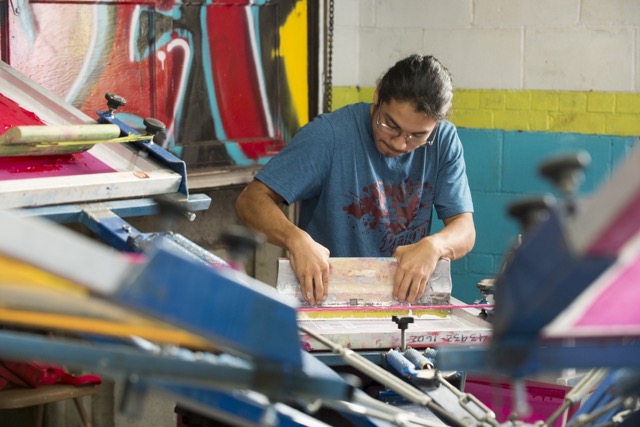 A member of Stitching Up Detroit inks a shirt at the screen printing facility at Grace in Action
A member of Stitching Up Detroit inks a shirt at the screen printing facility at Grace in Action
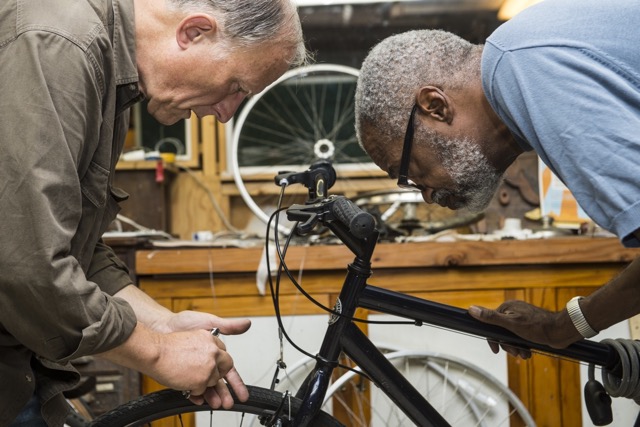 Working on a bike at Church of the Messiah
Working on a bike at Church of the Messiah
Then, when several local women wanted to utilize their existing skills to make extra money, they founded Cleaning in Action, a house cleaning cooperative, with the help of the church. The founders, who had previously worked for temp agencies and were scraping by, now make livable wages and hope to have 20 employees in the next five years.
Grace in Action helps the businesses in three main areas: strategy (feasibility work, marketing, business planning), back office services (accounting, legal, invoicing), and skills training (classes in coding, graphic design, cooperative incubation, and more). It also acts as an office and workplace until the businesses are able to branch out. In everything but name, the church is a business incubator.
All of the businesses at Grace in Action started when a community member approached church leadership with an idea. That’s one of the founding principles of Grace in Action—the shape of church would arise from the community itself. “We’re built around the concept of ‘church,’ a place that’s true to the original meaning of that word: democratic assembly,” Cummings says.
Church of the Messiah’s first business was founded by a mother who was sick of working two jobs and had a tea recipe the community loved. Now, Nikki’s Ginger Tea is shelf stable and can be found at 50 stores across the state, including Whole Foods.
Since then, the church has developed a more formal business support program, BLVD Harambee (the name comes from “Building Leaders for Village Development” and the Swahili word for “all pull together”). In addition to I AM Productions, BLVD Harambee has provided space and resources to a leather craftsman, bike shop, and fashion company, Kill the Hate, which sells out of the Cass Collective in Midtown.
Rising employment opportunities
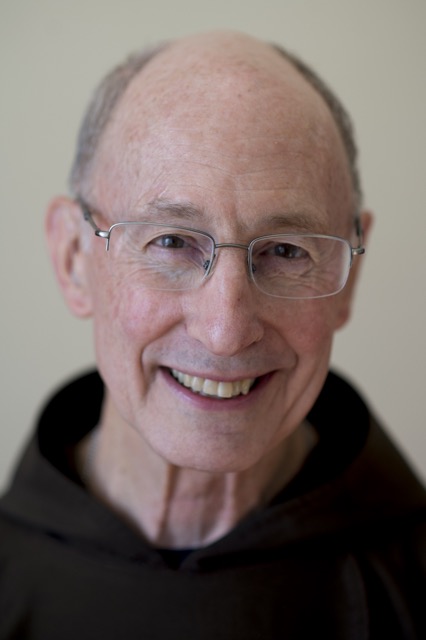 Brother Bob Malloy
Brother Bob Malloy
Not everyone can be an entrepreneur. But business incubation isn’t the only way Detroit churches make an economic impact.
The Capuchin Soup Kitchen has been in Detroit since 1929 and is best known for its free, daily lunches served from two locations, distributing about 2,000 meals per day. Though a Franciscan order of the Roman Catholic Church, no one is denied a meal based on religion and no prayer is required.
“If people are hungry, they need to be fed,” says Brother Bob Malloy, director of pastoral ministry at the Capuchin Soup Kitchen. “When they’re satisfied physically, then we invite them to think spiritually.”
The meal program is an important component of the Capuchin’s goal to end systemic poverty. But perhaps more crucial to that mission are its businesses, which provide entrepreneurial and job skill training to its employees.
Earthworks Urban Garden, started in 1997 next to its Meldrum Street location, grows food for the meal program and its Thursday market. It also offers gardening classes and after-school programming for youth.
The garden more recently started its Earthworks Training Program, or EAT, which is a nine-month intensive course for those interested in either starting their own urban agriculture business or working in the field. Students learn everything related to growing organic produce in a team-based environment, and several graduates have started their own businesses or farms after taking the course.
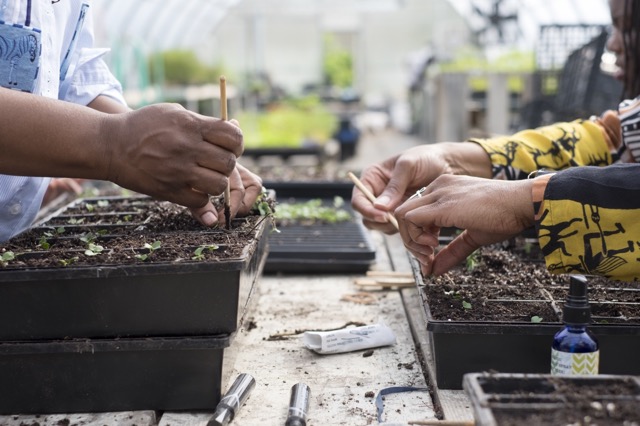 Planting seedlings at Earthwork Urban Garden
Planting seedlings at Earthwork Urban Garden
The Capuchins also founded On the Rise Bakery in 2006, and opened a cafe in 2014 on Gratiot Avenue. The bakery employs returning citizens and those in drug treatment through the ROPE program (“Reaching Our Potential Everyday”), training them in both the soft skills of customer service and hard skills of baking. Throughout the course of the one-year program, the men live together at the ROPE house, where they receive counseling services in addition to employment.
“One of the best and worst compliments we can get is, ‘My grandparents used to eat here,’” Malloy says. “That means we’re serving a third generation Detroiter. That’s why we’re constantly looking for ways to support independence beyond people coming here to eat.”
Grace in Action and the Church of the Messiah do trainings as well, bringing in experts for workshops that directly support businesses they help start. They’re also hubs for the Equitable Internet Initiative, a program that will provide a powerful, 1 gigabit Wi-Fi connection to 150 people in three neighborhoods (the third is in the North End).
[Read Model D’s article on the Equitable Internet Initiative, “How a surprising partnership will result in internet for Detroiters lacking access”]
A great deal of tech skill-building has and will take place over the course of the project—from training the digital stewards to install and distribute the connection, to the 20 students who will receive a free, four-week training in app development and coding through the NextGen Apps program.
All of these programs and startups emerged when church leaders listened to members of their congregations and communities. One item kept coming up as a persistent need: economic opportunity. And if business support services aren’t easily accessible in these neighborhoods, it doesn’t matter if it’s a church that’s prividing that opportunity.
Or, as Randolph says, “We’re not waiting to make it happen. We’re making it happen.”
This article is part of “Detroit Innovation,” a series highlighting community-led projects that are improving the vitality of neighborhoods in Detroit, while recognizing the potential of residents to work with partners to solve the most pressing challenges facing their communities.
The series is supported by the New Economy Initiative, a project of the Community Foundation for Southeast Michigan that’s working to create an inclusive, innovative regional culture.
All photos by Sean Work.

